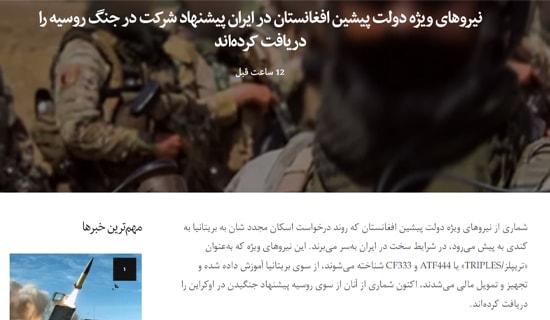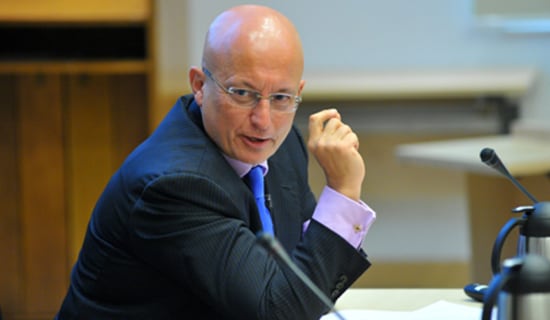On December 19, 2013, in an unusual measure, Iranian President Hassan Rohani published an Arabic article in the Saudi government daily Al-Iqtisadiyya. In the article, he stresses that he and his government remain committed to pursuing Iran's supreme interests and ideals, while also being committed to pursuing a path of moderation and common sense. It is this path of moderation, he says, that led directly to the Joint Plan of Action document regarding Iran's nuclear program attained this November in Geneva.[1] He adds that his government pursues the same moderate policy in its foreign relations as well, in a bid to establish mutual trust with its neighbors, with the U.S. and the West at large, and with its "traditional partners" and "new ones." This, he explains, requires Iran to establish a domestic consensus and to be transparent in defining its goals – a process that is currently ongoing in Iran.
Rohani emphasizes that, in today's world, no country, including the superpowers, can meet its challenges alone, but must cooperate with the other world countries. He underscores the importance of improving Iran's relations with Europe and the U.S., despite the fact that certain elements in both the West and the Middle East cast doubt on the likelihood of a permanent agreement between Iran and the West and try to paint Iran as a threat. Regarding the agreement on Syria's chemical weapons, Rohani expresses satisfaction that "diplomacy gained the upper hand" over the military option, and calls to continue in this direction.
As for Iran's nuclear program, he says that the claims that his country is trying to build a nuclear weapon have been proved to be baseless, and that Iran is committed to avoiding the development and manufacture of such a weapon, in accordance with the fatwa issued by Supreme Leader Ali Khamenei.[2] He adds that developing, attaining or using atomic weapons contravene the directives of Islam, and may undermine Iran's security and national interests.
The publication of this article in a Saudi paper may represent an attempt by Iran to appeal to the Gulf states, especially to Saudi Arabia itself, and to convince them of Iran's sincere desire to improve its relations with them and with the West. It should be mentioned that, since Rohani's election, and even more so since the Joint Plan of Action was agreed upon by Iran and the international community, Iran has been making conspicuous efforts towards rapprochement with the Gulf. This has found expression in visits by the Iranian foreign minister in some of the Gulf states and in statements by senior Iranian officials regarding their desire to tighten relations with these countries.
The following is a translation of the main parts of Rohani's article:[3]

Iranian President Hassan Rohani
A Policy Of Moderation Will "Enable Us To Steer Our Foreign Policy Towards [Achieving] Domestic Economic Growth"
"When I entered the election as a candidate for the Iranian presidency, I promised to achieve a balance between [the dictates of] reality and the effort to realize the supreme ideals of the Islamic Republic. And indeed, I gained the support of the voters [and won] by a large margin. The mandate I have received from the public obliges me to [pursue a policy of] moderation and common sense, and this is indeed the [kind of] policy my government is pursuing, in all domains. This sense of commitment [is what] led directly to the international interim agreement achieved [this] November in Geneva regarding Iran's nuclear program, and it will continue to guide our government's decision-making process in 2014.
"In all matters of foreign policy, my government eschews any form of extremism, for we aspire to establish effective and constructive diplomatic relations, with focus on building mutual trust with our neighbors and with the regional and international bodies active [globally]. This will later enable us to steer our foreign policy towards [achieving] domestic economic growth. To this end, we shall act to defuse the tension in our foreign relations [with other countries] and to tighten the bonds with our traditional partners as well as with new ones, in equal measure. This naturally requires [us] to reach a consensus in the domestic arena and to be transparent in defining our goals – and that is what we are currently doing.
"While making sure to steer clear of confrontation and hostility, we shall [nevertheless] be diligent in pursuing our supreme interests. However, since the world's countries are becoming increasingly interconnected, we shall be able to meet the challenges only through mutual and intensive cooperation with [other] countries. No country – including the superpowers – will be able to effectively meet its challenges on its own."
This Year's Presidential Elections Proved That Our Religious Democracy Is Gaining Maturity
"The fact that the developing and growing economies are quickly gaining on [the advanced world in their rate of growth] means that their collective economic clout is about to surpass that of the advanced world. According to assessments, by 2030 the countries that are currently developing and growing will produce nearly 60% of the gross world product, compared to [only] 40% in 2000. This may allow these countries to play a much larger role in the global arena. In this interim stage, Iran can strengthen its role in the world.
"This year's [presidential] election, which had a voter turnout of nearly 75%, indicated that our religious democracy is gaining maturity. Thanks to the Iranian culture [and] the ancient Iranian civilization, [thanks to] the longevity of the [Iranian] state, with its [good] geopolitical standing and its social stability despite the unrest in the region, and [thanks] to the well-educated Iranian youths, we can face the future with confidence and aspire to fulfill the major international role that befits our people – a role that no active force in global politics can disregard.
"We are still learning how to improve our bilateral and multilateral relations with Europe and North America on a basis of mutual respect. This requires us to ease the tension and adopt a comprehensive approach that encompasses [the issue of our] economic relations [with other countries as well]. We can begin to avoid [creating] any new tension in Iran-U.S. relations, while also striving to defuse the old tensions that continue to cloud the relations between our two countries. While it may not be possible to forget the distrust and suspicion that [characterized] Iran's attitude to the American governments for the past 60 years, we must [nevertheless] focus on the present and face the future. This means transcending pointless political [quarrels] and steering a pioneering path, instead of succumbing to pressure groups in both countries.
"We believe that cooperation in all matters of mutual interest may help ease the tension in the region as well. This means confronting those in the U.S. and in our region who are trying to draw the world's attention away from the matters in which they are directly entangled and to prevent Iran from strengthening its regional standing. They do this by downplaying the likelihood of negotiating a permanent agreement regarding [Iran's] nuclear program, which only increases the chances for continued conflict between Iran and the U.S."
We Are Prepared To Participate In Establishing Peace And Stability In Syria
"[Now] more than ever before, our region is combating sectarianism, hostility and [conditions] that constitute fertile ground for extremism and terror. Moreover, the recent use of chemical weapons in Syria may be a source of concern for the peoples of the region for many years to come. We believe that, in the current circumstances, the voice of moderation in the region can have a constructive and positive influence on events.
"Undoubtedly, the unrest in the countries neighboring [us] affects the interests of many regional and international elements, which must work in tandem to ensure long-term stability. The reality is that Iran – as a regional power – is supremely prepared to work in this direction and will not spare any effort to facilitate solutions. Hence, those who present Iran as a threat and strive to undermine its reliability in the eyes of the region and the world must definitely stop doing this, for the sake of peace and quiet within the region and outside it.
"I am greatly concerned by the humanitarian tragedy in Syria and the Syrian people's tremendous suffering [that has lasted] nearly three years. My government, representing a nation that has suffered the horrors of chemical weapons, harshly condemned the use of these weapons in the Syrian conflict. I am also greatly concerned that a number of regions in Syria have become fertile breeding grounds for extremist ideologies and areas where terrorists congregate, resembling the situation that prevailed on our eastern border during the 1990s. This issue is of vast importance for many other countries as well. Attaining a permanent political solution in Syria requires cooperation and joint effort.
"Therefore we are glad [to see] that in 2013 diplomacy gained the upper hand over threats of military intervention in Syria. We must embrace this progress and understand that Syria sorely needs coordinated regional and international efforts. We are willing to take part in establishing peace and stability in Syria within the framework of serious negotiations among regional and extra-regional parties. In this case, too, we must prevent the talks from becoming a zero-sum game."
The Development, Manufacture, Hoarding And Use Of Nuclear Weapons Contradict The Directives Of Islam; We Are Committed To Khamenei's Fatwa Banning Nuclear Weapons
"This is equally true of the Iranian nuclear energy program for civilian purposes, which has been the subject of much clamor and exaggeration in recent decades. Since the early 1990s, the predictions on how close Iran was to obtaining a nuclear bomb have [consistently] turned out to be baseless. During this entire period, experts in intimidation and threats sought to portray Iran as a threat to the Middle East and the world. We know full well who the chief inciter is, and what objectives are served by the inflation of this topic. We also know that these mendacious claims change in tandem with the degree of international pressure [that is exerted on Israel] to cease building settlements and end the occupation of the Palestinian territories. Nevertheless, these false warnings persist despite the American National Intelligence Estimates that Iran had not decided to develop a nuclear weapon.
"The truth is that we are committed to avoid developing and manufacturing a nuclear bomb. As declared by the fatwa of Supreme Leader Ayatollah Ali Khamenei, we genuinely believe that the development, manufacture, hoarding and use of nuclear weapons contradict the directives of Islam. We never even considered the option of obtaining nuclear weapons, since we believe that such weapons can destroy our national security interests, and therefore nuclear weapons have no place in Iran’s security doctrine. Merely the thought that Iran could manufacture nuclear weapons could damage our security and national interests as a whole.
"During my [presidential] election campaign, I committed myself to investing most of my efforts in expediting a solution to the conflict surrounding the Iranian nuclear program. Faithful to this commitment, and in order to exploit the window of opportunity created by the recent elections, my government is fully prepared to invest all possible efforts in reaching a permanent solution acceptable to all parties. Pursuant to the interim agreement [attained] in November [2013], we are prepared to continue working with the P5 +1 group (the five permanent UNSC members and Germany) and with other countries to guarantee the full transparency of our nuclear program.
"We will use the nuclear capabilities that we have managed to develop for peaceful purposes, in the framework of guarantees recognized by the international community. This capability will be subject to multilateral IAEA supervision, as was the case in recent years, [and] this will allow the international community to assure itself that the nature of our nuclear program is exclusively peaceful. We do not ever intend to forgo our right to benefit from nuclear energy, but we are prepared to act to remove any ambiguity and respond to any reasonable question about our program.
"However, continued application of pressure, arm-twisting, intimidation and coerced arrangements designed to prevent Iran from meeting all its vital [needs] – from technology to medicines and food – will inevitably produce a dismal atmosphere and destroy the requisite conditions for achieving progress. As we’ve demonstrated in 2013, Iran is totally prepared to seriously join the international community and conduct negotiations… with wholly good intentions. We must only hope that our colleagues will be similarly prepared to seize this golden opportunity."
Endnotes:
[1] On the Joint Plan of Action, see MEMRI Special Dispatch No. 5535, "The Geneva Joint Plan Of Action According To Iranian President Rohani And Iranian FM Zarif , November 24, 2013.
[2] On the question of whether this fatwa exists, see MEMRI Inquiry & Analysis No.825, "Renewed Iran-West Nuclear Talks – Part II: Tehran Attempts to Deceive U.S. President Obama, Sec'y of State Clinton With Nonexistent Anti-Nuclear Weapons Fatwa By Supreme Leader Khamenei," April 19, 2012 ; Special Dispatch No.546, President Obama Endorses The Lie About Khamenei's 'Fatwa' Against Nuclear Arms September 29, 2013; Special Dispatch No.5406, "Release Of Compilation Of Newest Fatwas By Iranian Supreme Leader Khamenei – Without Alleged Fatwa About Nuclear Bomb," August 13, 2013.
[3] Al-Iqtisadiyya (Saudi Arabia), December 19, 2013.





